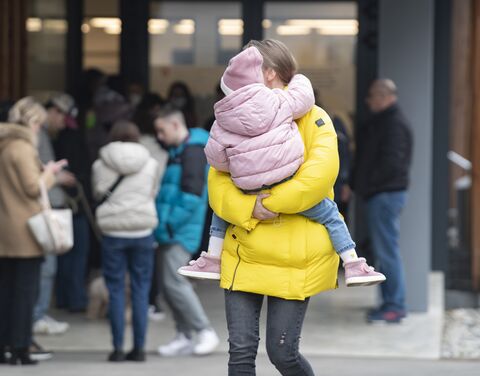
Are you interested in taking in refugees from Ukraine? What you should know
The number of refugees arriving from Ukraine is rising daily in Switzerland as well. According to the latest figures from the State Secretariat for Migration (SEM), over 18,000 people have now registered in Switzerland (as of March 29). There has been quite an outpouring of interest in helping the refugees, and many people are offering up their private rooms or apartments. We have answers to key legal questions about taking in refugees from Ukraine.
As a private individual, what costs besides food and lodging am I responsible for when I take in a refugee?
Basically, all persons with protection status S will receive social assistance from the canton. This means that the living expenses for refugees will be paid by the community or the canton, so you won’t have to pay any further costs if you take in Ukrainian refugees.
I would like to offer my vacation apartment to Ukrainian refugees. Do I need to notify the authorities?
If you do not ask the refugees to pay rent, then you are not required to notify the authorities. If you ask for some compensation for the lodging, then you must register the arrival of the refugees with the responsible cantonal authorities. Basically, persons from Ukraine are permitted to stay in Switzerland for 90 days without a visa. After this time, they must apply for a residence permit.
We rent, but we’d like to take in another person. Can my landlady/lord stop us from doing this?
As is the case whenever you sublet, the landlady/lord must be informed if you would like to take in a subtenant. The landlady/lord must have very good reasons for denying you. The landlady/lord does not need to agree if this would cause the apartment to be overcrowded.
If you do not ask for rent, but want to invite the refugee to live with you for free, you do not have to inform your landlady/lord. We would suggest you inform them anyway.
Do I need to have a written rental agreement if I take in a refugee for free?
If you take in a refugee for free, then this is not a leasing relationship from a legal perspective. In other words: A written contract is not necessary. And under the law, rental agreements can also be informal, which means oral agreements are valid. However, in reality, it is advisable to put all agreements or arrangements in writing.
Where should I register if I want to take in refugees?
You can either register with the Swiss Refugee Council (German) or with the Campax organization (German).
What notice periods apply for subletting?
Just as for regular rental agreements, a notice period of at least three months is the rule. If only a temporary rental agreement is concluded, then no notice period is necessary.
If only a single furnished room is rented out, the minimum notice period is 14 days. It is always permissible to extend the notice period past the legal notice period in a contractual agreement. If no other agreements have been made, then the legal provisions apply.
Am I entitled to financial support from the community or the canton?
The cantons receive a fixed amount from the federal government for lodging and caring for people who are taken in. The cantons are responsible for deciding, for example, what they will pay private individuals for housing refugees. For more detailed information, please contact your municipal or cantonal authorities.
Ukrainians have been given protection status S. What does this mean?
Switzerland grants refugees from Ukraine protection status S in order to provide them quick and uncomplicated shelter in Switzerland. As a result, there is no need to follow the regular asylum procedure.
In practice, protection status S means: Ukrainian refugees receive a residence permit, are entitled to lodging and medical care, may obtain a work permit, and their children can attend school.
How are refugees insured?
The responsible authorities ensure that the refugees receive health and accident insurance. Liability insurance is not mandatory. However, you might want to clarify whether the authorities in your community provide liability insurance for the refugees as well.
Who is responsible for the costs if the people living in my apartment damage something?
If you are a tenant yourself, you are liable to your landlady/lord for damages caused by the people living in your apartment.
The people living in your apartment are liable to you for the damages they cause. If you have liability insurance, you should check whether it covers the damages.
What are my rights as the host to people I shelter? Can I request that they move out at any time?
No, you cannot ask from one day to the next that the refugees move out. Any contractual agreements and the statutory minimum notice periods must be observed.






